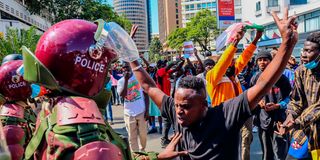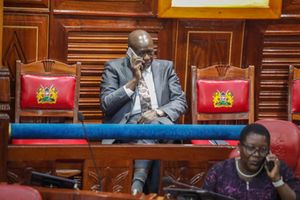
A police officer engages with protesters demonstrating along Kenyatta Avenue in Nairobi during anti-Finance Bill demos on June 25, 2024.
It was after a long day of ground engagement in rural Murang’a one evening last week. We were seated with a group of members of the county assembly watching on television the Gen Z revolt on Nairobi streets. One MCA asked a very poignant question, “Have you ever experienced a major political difficulty?"
I responded that I had because, of course, the world is full of ups and downs. Every day one learns and unlearns things.
One of the most interesting political difficulties happened as I was planning to transit to the Senatorial position from Member of Parliament a few months before the 2017 elections. My Constituency had six wards and one of them had been a consistent political stronghold. Then it happened: the company that used to supply water to this ward decided to hike tariffs to the chagrin of the residents.
I mobilised residents to demonstrate against the hiked tariffs but the company was adamant. We then took the company to court and obtained a stay order. I was the lawyer and one resident was the petitioner. The company slyly approached the petitioner behind my back and through unorthodox means managed to have him withdraw the suit hence the stay orders lapsed. The tariffs took effect.
Propaganda arose
Suddenly, propaganda arose that I was party to the withdrawal of the orders. I made all attempts to explain myself to the residents to no avail. I could not believe how such a falsehood could be believed knowing how strongly I had fought against the tariffs.
There was the temptation of blaming political competitors but I refused to take this route. Why blame external parties for my own political problems?
Was there something I might have done which had created fertile ground for such propaganda to thrive?
The truth was the false water tariffs propaganda was just a ruse or decoy. There were underlying public grievances that I had not taken seriously.
Some were hilarious. That I needed to improve on my dressing to match the image of a parliamentarian. That my speeches needed to be recast to give a more serious nuance. I had to do all these adjustments to fit the people's expectations because "it is not really about me, but the people". I had previously heard about these murmurs but had brushed them aside — only to realise their potency during crunch time.
Hong Kong Martial arts movie hero Bruce Lee was right when he said, "Be like water making its way through cracks. Do not be assertive but adjust to the object and you shall find around or through it. If nothing within you stays rigid, outward things will disclose themselves...Be formless like water which takes the form of the container".
Tactical retreats also help. A tactic of guerrilla warfare states: "When the enemy advances, we retreat. He camps, we harass. He retreats, we pursue ".
Mwai Kibaki himself did a tactical political retreat. In 1974, he retreated to Othaya from Bahati constituency in Nairobi after he miraculously survived Jael Mbogo’s political onslaught in the city.
A retreat includes a potential government shakeup, with more qualified hands on the deck. It includes reducing governing expenditure to curb wastages.
The Finance Bill protests raised genuine concerns but there are hidden, deeper issues that require a honest public conversation. Changes to the Finance bill will not mollify Gen Z.
Could one trigger be the new university education financing model? The revolt has resonated with university campuses located across the country. We need to investigate if students have dropped from college or failed to report due to this new arrangement. I have met parents and students aghast on seeing the amounts of money required in university admissions letters.
Youth unemployment is also a potential cause. Maybe we need to reintroduce something like the Kazi Kwa Vijana programme. The United States in 1930s during the Great depression introduced work-study programmes aimed at tackling youth unemployment. Kenya can replicate this.
The Gen Z seem powered by the educated youths incubated by the Kibaki government. A robust graduate internship schemes might help.
Expanded internship programme
Might an expanded internship programme help more graduates? Or Maybe private companies that offer graduate internships can obtain tax rebates.
Kenya Kwanza won through bypassing key gatekeepers like the media. But the tactics one uses when acquiring power are not necessarily applicable when governing. These gatekeepers remain powerful. Probably a rapprochement with them might help. For example, the Islamic Brotherhood obtained power through a revolution during the Arab Spring in Egypt and Mohamed Morsi became the president. But he did an error by ignoring the army, who are traditional gatekeepers of Egyptian politics. He was kicked out. The same happened in Pakistan after cricketer Imran Khan got power. It helps to make peace with gatekeepers once getting into power.
Kibaki was right when he banned through law ostentatious display of money through fundraisings. He came out as a “mean” leader but succeeded. Nicholo Machiaveli in "The Prince" said: "A reputation of generosity is thought to be desirable but it's dangerous. Generosity exercised in true virtuous ways is never seen by others. But if you want to be thought of as a generous ruler, you must keep a lavish public display. To support this habit, rulers have to raise taxes and squeeze money from his subjects. Generosity of this sort benefits few and harms many."
Let us craft policies for the forgotten men and women of Kenya; policies that impact as many as possible and as soon as possible. As utilitarianism states, "greatest happiness for the greatest number ".
Kenya is a beautiful project that we must bequeath our children for posterity. But our remedies should be done fast: "Shock and awe" therapy that jolts our society forward.
Let us be an empathetic government. Let this crisis be turned into an opportunity to re-engineer ourselves.
Dr Kangat is the Governor of Murang’a County; Email: [email protected]










